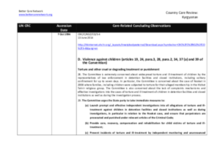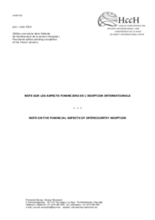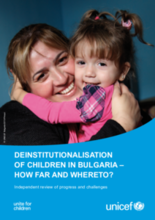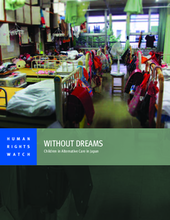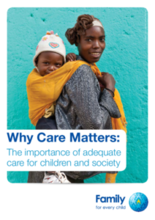Displaying 681 - 690 of 1025
This article discusses the challenges in protecting Guatemalan children and their families from involuntary separation and presents the process, results and implications of a pilot training in which Guatemalan participants from government and civil society explored the efficacy and feasibility of the FGC model in their country.
This country care review includes the care related Concluding Observations adopted by the Committee on the Rights of the Child as part of its examination of the third and fourth periodic reports of Kyrgyzstan (CRC/C/KGZ/4-5) during its 65th Session at its 1880th and 1881st meetings held on 28 May 2014, and adopted, at its 1901st meeting, held on 13 June 2014.
To address the issues related to the financial aspects of intercountry adoptions, the Hague Convention initiated an Experts’ Group, which met in October 2012 and produced nine Conclusions and Recommendations, which they brought to the Permanent Bureau to publish as a “Note”.
In this post from Community Child Protection Exchange, Sarah Lilley - Deputy Head of Child Protection, Save the Children UK and Coordinator for the Inter-Agency Learning Initiative on Community-Based Child Protection Mechanisms and Child Protection Systems - reflects on the last five years of building an evidence base on community-based child protection mechanisms.
This Review, commissioned by UNICEF Bulgaria, is aimed at informing the recommendations for the Bulgarian Government’s Action Plan for the implementation of the National Strategy ‘Vision for Deinstitutionalisation of Children in Bulgaria.’
This country care review includes the care related Concluding Observations adopted by the Committee on the Rights of Persons with Disabilities as part of its examination of the first periodic report of Azerbaijan under Convention on the Rights of Persons with Disabilities at its 125th and 126th meetings, held on 1 and 2 April 2014, respectively.
This article highlights the historical role churches have played in child protection stemming from biblical teachings and mandates as well as a current example of church involvement in child protection.
This report by Human Rights Watch examines Japan’s alternative care system for children. It describes its organization and processes, presents current data on the use of different forms of alternative care and highlights the problems found in the institutionalization of most children (including infants), as well as abuses that take place in the system.
This report highlights the needs of children without adequate family care, the impact inadequate care on children and society, and why family care is important. In this report, Family for Every Child also issues several recommendations for those in all sectors of society and an example of care reform from Brazil.
This video documents Save the Children's work in Armenia to reform the child protection system, including its use of the Guidelines for Alternative Care as a roadmap to focus on supporting a range of appropriate family environments for children without appropriate care.

